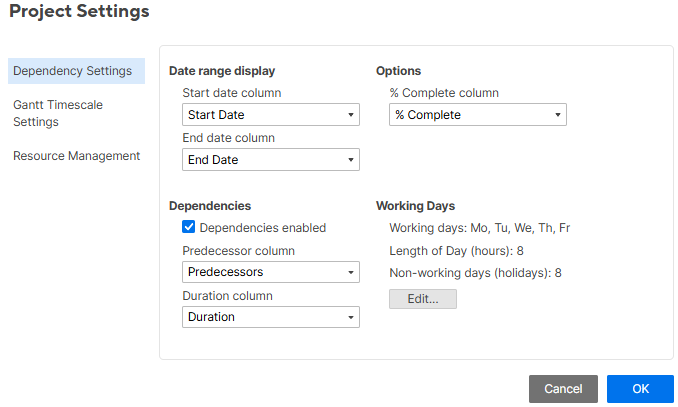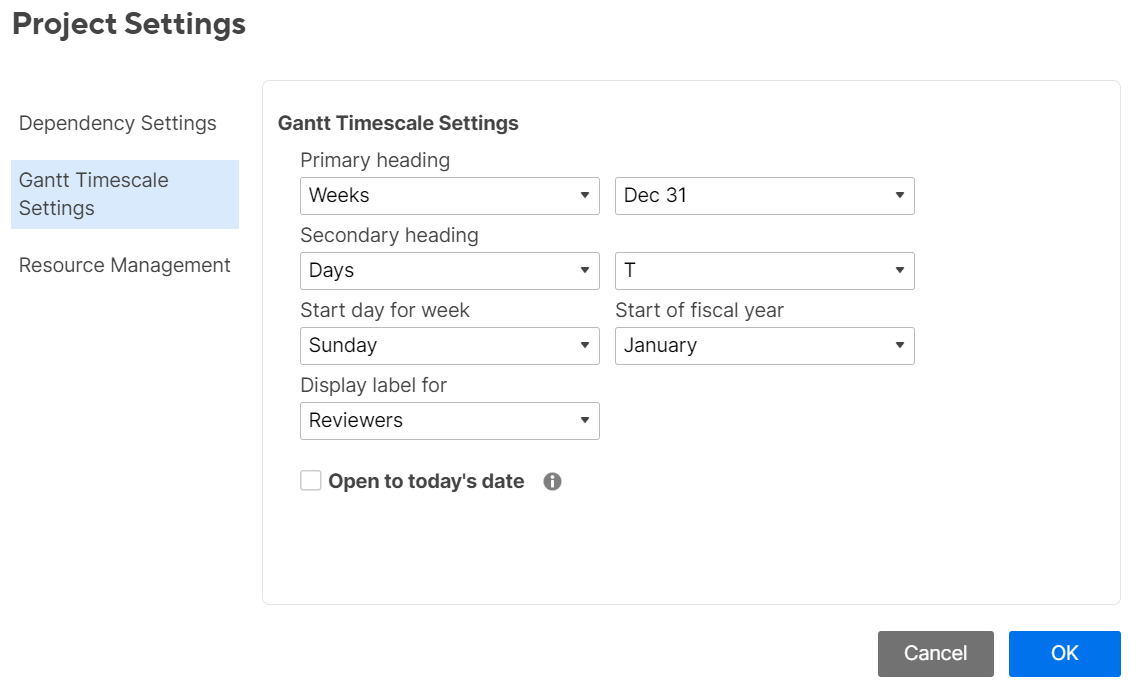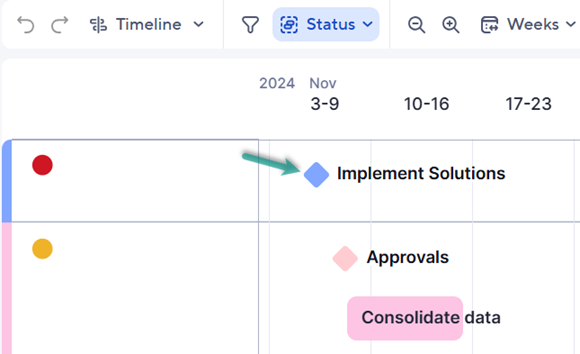Follow these step-by-step instructions to modify project settings.
Smartsheet provides essential tools for effective project management to empower your teams to execute together with speed and accountability and reach successful outcomes faster.
Project settings in your sheets
The Resource Management section is only available for Business or Enterprise plans.
You can access Project Settings from the grid view or Gantt view:
- From Gantt view: Right-click any column header in the Gantt view and select Project Settings, or go to the settings toolbar button in the top right corner of the sheet.
- From grid view: Right-click any column header in the sheet and select Edit Project Settings.
Gantt Timescale Settings only appear when editing Project Settings from Gantt view.
Dependency settings

Date range display
Use the Start Date and End Date columns to track the start and end dates.
Gantt view requires a start and end date (not backed by column formulas) to load. However, the timeline view only needs one date column to load when not utilizing project settings. If your sheet includes more than one date column, the Project Settings require both a start and end date.
% Complete column
The % Complete automation is optional. Select the column you want to assign as your % Complete column. This column overlays a % complete indicator within the task bars only for the Gantt chart, allowing you to see automated % complete calculations.
When dependencies are enabled and you are using hierarchy in your sheet, Smartsheet automatically calculates the % complete in parent rows based on the child rows' duration and % complete values. To format values in this column as percentages, select the column header at the top, then select the % icon in the left toolbar.
Dependencies
To enable dependencies, you need to assign Predecessor and Duration columns. If your sheet doesn’t have existing predecessor or duration columns, Smartsheet automatically creates them for you.
- Predecessor: This column creates dependencies between tasks in the schedule.
- Duration: This column automates scheduling a task's start and end dates. It represents the number of working days the task must take to complete.
Enabling dependencies impact a row's start and end dates as it automatically calculates and adjusts these date values based on changes to the row's Duration and Predecessor values.
With dependencies enabled, you can configure working and non-working days, set hours, and exclude specific dates such as holidays. By default, Smartsheet considers each working day to include 8 hours.
Once dependencies are enabled:
- Rows with Duration and/or Predecessor values have their start and end dates calculated automatically.
- The system automatically adds the given duration to the start date to calculate end dates (taking into account non-working days).
- If a predecessor drives a task's start or end date, you can manually change it by clicking the cell and selecting a new date. This overrides the association with the predecessor and removes the predecessor value from the row.
- If a parent row has a predecessor value listed, this dependency relationship drives the start dates for each child row. Removing the predecessor value on the parent row makes child rows editable, so you can change dates manually.
- The start and end dates of tasks that depend on a predecessor aren’t editable from a report, a row update request, or any mobile app. To work around this, manually update a task's start date or duration to update the end date automatically.
See Activate dependencies and use predecessors for more details.
Gantt timescale settings

Edit the following timescale settings used in Gantt view:
- Configure the appearance of the Primary and Secondary headings. These appear along the timescale at the top of the Gantt view. Switch between days, weeks, months, quarters, and years, and select the styling of dates.
- Customize the Start day of the week and the month that begins the Fiscal year.
- Choose any column to Display as the label to the right of the Gantt bar. For example, select a contact list column as the display label to see a list of the people assigned to each task next to the Gantt bar.
- Choose whether Gantt view Opens to today’s date.
- This option is only available to the sheet’s Owner and Admins.
- This setting is your preference and doesn't influence how your collaborators view the Gantt view.
- If someone with Editor or Viewer permissions wants the Gantt view to open to today, you can create a report from your sheet. Any user who has access to the report can access the Gantt Timescale Settings to enable the option Open to today's date.
Resource Management settings
Learn more about the Resource Management project settings.
Follow these step-by-step instructions to create milestones in your project sheet.
Create a milestone in your sheet
In the Gantt and timeline views, a diamond shape represents a milestone.

Create a milestone
For Gantt view, you must have two date columns. However, if you add just one date column, either the start or end date, that row becomes a milestone.
For timeline view, you don’t require two date columns if:
- Your timeline view only has one date column; all rows appear as milestones.
- Your timeline view has two or more date columns; you can create a milestone by providing either a start or an end date.
If you have dependencies enabled, you can also create milestones by having the same date for the start and end date and setting its duration to zero.
% complete rollups are not available for parent tasks that contain subtasks that are milestones.
Follow these step-by-step instructions to setup your parent rollup functionality in a project sheet.
Parent rollup functionality in sheets
You can create parent rows by indenting other rows beneath them. These indented rows become child rows. Learn more in Hierarchy: Indenting & Outdenting Rows.
Start Date, End Date, Duration, and % Complete for parent rows
The Start Date for a parent is the earliest start date from all of its child rows. Similarly, the End Date is the latest end date from all its child rows.
The Duration on the parent reflects the number of working days between the parent row's Start Date and End Date. Instead of a sum of their durations, it provides a full-time span from the start of the earliest subtask to the end of the latest subtask.
The % Complete on the parent row calculates a weighted percentage based on the Duration and % Complete entered on each child row. In this way, completing child rows with shorter durations doesn't impact the parent row % Complete as much as completing a longer duration child row.
The parent row rollup includes subtasks with a given Duration and a % Complete value.
Parent rows don't calculate % Complete rollups when child rows contain milestones (duration = 0).
Parent rollup functionality tips
- You can’t edit the Start Date, End Date, Duration, and % Complete columns in parent rows with dependencies enabled. To edit these values, you can deactivate the dependency functionality on the sheet or create additional columns not affected by dependencies for your calculations.
- You can’t use custom formulas to change the display or bars in the Gantt view.
- The parent task bars in dependency-enabled sheets have a grey background in the Gantt and calendar views.
- Parent rows always reflect duration in partial working days, even if you use other formats to show duration for the child rows.
